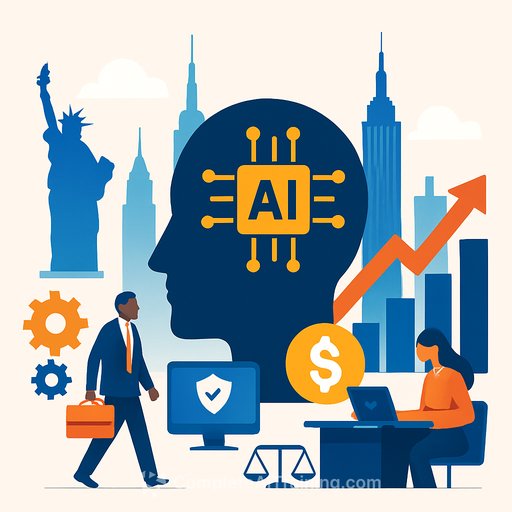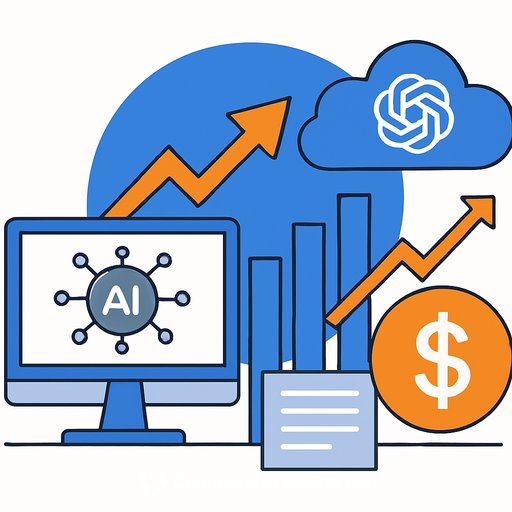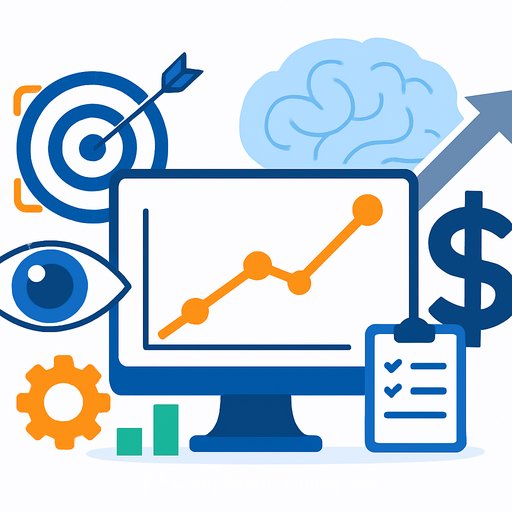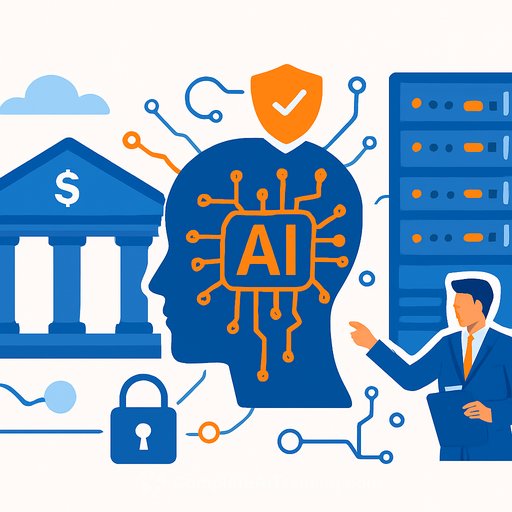The Complete Guide to Using AI in the Financial Services Industry in New York City in 2025
New York City's 2025 AI-in-finance landscape: Over 40,000 AI professionals, more than 1,000 AI firms with roughly $27 billion raised since 2019, and a $500 million+ Empire AI initiative powering 11× faster training and 40× faster inference. Success depends on bounded pilots lasting 6–9 months, strong MLOps, clear governance, AEDT audits, and measurable KPIs like cutting manual hours by 50%.
New York City stands out for AI in finance because it combines scale, infrastructure, and policy. The city’s dense talent pool and funding, plus a $400 million Empire AI public–private partnership, enable financial firms to hire top talent and iterate models faster than most markets. Regulators and the industry collaborate here, with forums like the Federal Reserve Bank of New York’s Innovation Conference highlighting AI risks, tokenization, and operational resilience. This means firms must balance speed with strong governance.
For teams seeking practical AI skills, structured programs offering training in prompt engineering and applied AI across business functions can deliver results within 15 weeks, helping firms capture the competitive edge expected by 92% of NYC executives.
What is AI in Finance? A Beginner's Primer for NYC Professionals
AI in finance refers to tools like machine learning, natural language processing, and predictive analytics that help banks and trading desks make faster, more accurate decisions. It automates routine tasks and extracts insights from large data sets. Use cases include algorithmic trading, real-time fraud detection, document processing, and personalized customer advice.
For finance professionals in New York City, the key takeaway is that AI shifts work from manual rules and spreadsheets to model-driven workflows. This allows risk, compliance, operations, and customer teams to scale efficiently without proportional increases in headcount.
How is AI Being Used in NYC's Financial Services Industry?
Financial firms in New York are moving AI beyond pilots into full production. Banks and fintech companies employ machine learning for real-time fraud scoring and anomaly detection that process thousands of transactions in seconds. They automate compliance reporting and KYC workflows, and deploy virtual assistants and agentic AI for routine customer tasks and proactive outreach.
Large institutions, like BNY Mellon, invest heavily in scale and governance. Their enterprise AI platform “Eliza,” powered by NVIDIA supercomputers, supports over 50 AI solutions in production for anomaly detection, predictive analytics, and client services.
Regulators and bar associations caution about risks such as generative AI “hallucinations,” third-party model concentration risk, and AI-enabled social engineering. Firms that combine fast model deployment with strong governance, third-party controls, and inter-agency coordination can reduce manual costs while minimizing false positives and regulatory issues.
Future AI Trends in NYC Finance for 2025
Key trends moving from experimentation to production include generative AI, synthetic data, and industrialized MLOps. Large language models (LLMs) and agentic workflows are reshaping research and desk automation.
NYC firms should prioritize building pipelines and governance frameworks now. Investing in MLOps, synthetic data strategies, and explainability will help accelerate value delivery without increasing regulatory risk.
New York City's AI Strategy and Policy Landscape
New York’s AI strategy centers on Empire AI, a state-led public–private university consortium pooling supercomputing resources, researchers, and curricula. The goal is to steer AI development for the public good and expand local talent pipelines.
This commitment is supported by new academic programs and consortium growth. Universities like UB are broadening AI degree offerings, increasing the supply of engineers, policy experts, and applied researchers NYC financial firms can partner with. This helps validate models, run privacy-preserving experiments, and shorten time-to-production within local governance frameworks.
Regulatory and Legal Environment for NYC Finance Firms
Local Law 144 governs automated employment decision tools (AEDTs) used for hiring, promotion, or screening in NYC. It requires an independent bias audit within one year before use, public posting of the audit summary, and advance notice to affected candidates or employees.
Finance firms must inventory their AEDTs, collect and preserve demographic and model data for audits, and formalize recordkeeping and HR/legal workflows to ensure audit results and notices are timely and traceable.
Implementing AI in NYC Financial Firms: Practical Steps
- Start with one high-confidence, bounded use case to demonstrate ROI quickly.
- Pair the pilot with a unified data platform and clear governance to ensure models are auditable and reusable across teams.
- Aim for measurable cycle-time or cost reductions within a 6–9 month pilot window.
Risks, Governance, and Mitigation in NYC Finance
Firms must treat AI as a reshaping of cyber risk, not an optional add-on. AI increases exposure to deepfake social engineering, faster vulnerability scanning by adversaries, concentration risk from third-party AI vendors, and larger pools of non-public information, raising breach impact.
Controls include updating risk assessments to include AI and vendor exposure, enforcing strong access controls and multi-factor authentication, and conducting staff training and simulation exercises.
Talent, Events, and Ecosystem in NYC for AI in Finance
NYU leads the AI-for-finance talent pipeline and events ecosystem. Stern School of Business hosts dedicated finance research centers linking academia and industry. NYU provides practical AI training and tooling for practitioners, helping finance firms develop and hire skilled AI talent.
Conclusion: Roadmap for NYC Financial Services Firms Adopting AI in 2025
To adopt AI effectively, NYC financial firms should:
- Begin with one bounded, high-confidence pilot targeting a single, auditable KPI.
- Establish a governance baseline aligned with NYC expectations and NYDFS cyber guidance.
- Invest in MLOps and synthetic-data workflows to ensure models are reproducible and auditable at scale.
- Upskill workforce so product, risk, and operations teams can validate outputs and detect hallucinations.
Frequently Asked Questions
Why does New York City matter for AI in the financial services industry in 2025?
New York combines scale, talent, and infrastructure. The city hosts over 40,000 AI professionals, more than 1,000 AI firms raising about $27 billion since 2019, and benefits from the $500 million+ Empire AI public-private initiative accelerating compute and research.
What practical AI use cases and benefits are financial firms deploying in NYC today?
Use cases include real-time fraud and anomaly detection, automated compliance and KYC workflows, document extraction, and agentic virtual assistants handling customer tasks.
What are the key regulatory and legal requirements NYC finance firms must follow when using AI?
Local Law 144 requires automated employment decision tools to undergo independent bias audits within a year before use, post audit summaries publicly, and provide advance notice to affected candidates or employees.
How should a New York City financial firm implement AI safely and quickly?
Choose one bounded, high-confidence pilot with a clear KPI. Unify data and set up MLOps and governance for auditability. Run a 6–9 month pilot, measure results, collaborate with local vendors and universities, then scale with centralized governance and staff upskilling.
What operational risks must NYC finance firms mitigate when adopting AI, and what controls are recommended?
Risks include AI-enabled social engineering, deepfakes, concentration risk from third-party models, model hallucinations, and exfiltration of non-public information. Controls involve updating risk assessments, enforcing strong access controls and MFA, plus staff training and simulation exercises.
For those looking to build practical AI skills in finance, check out Complete AI Training’s latest courses for structured learning paths focused on prompt engineering and AI applications.
Your membership also unlocks:






